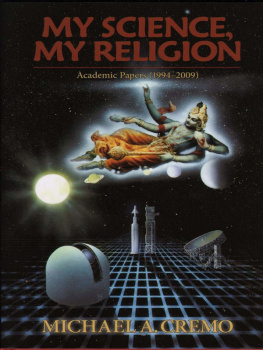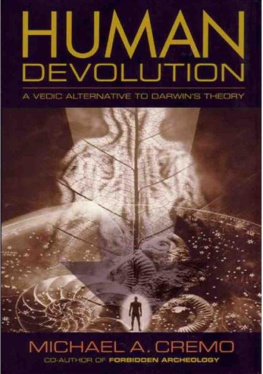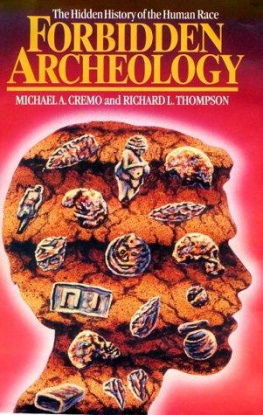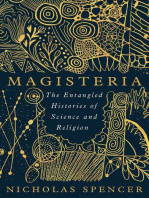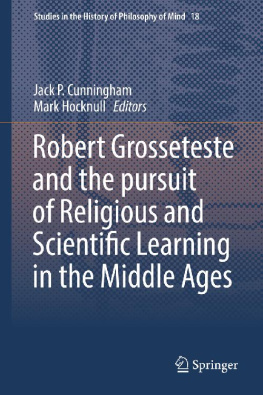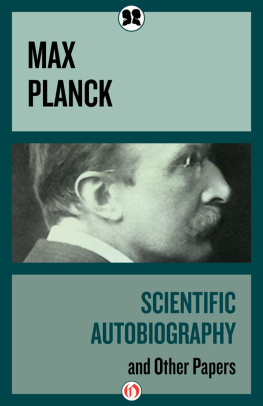MY SCIENCE, MY RELIGION
Academic Papers (1994-2009)
MICHAEL A. CREMO
Table of Contents
torchlight
publishing
Readers interested in the subject matter of this book are invited to correspond with the author at:
Bhaktivedanta Book Publishing Inc.
9701 Venice Blvd. Apt. 3 Los Angeles, CA 90034, USA or
Copyright 2012 Michael A. Cremo
All rights reseved. No part of this book may be reproduced, stored in a retrieval system, or transmitted in any form, by any means, including mechanical, electronic, photocopying, recording, or otherwise, without the prior written consent of the publisher.
Published by Bhaktivedanta Book Publishing, Inc. Science Books Division
Exclusively distributed by Torchlight Publishing, Inc.
P. O. Box 52, Badger, CA 93603, USA www.torchlight.com
Library of Congress Cataloging-in-Publication Data Cremo, Michael A., 1948
My science, my religion : academic papers (1994-2009) / Michael A. Cremo. p. cm.
ISBN 978-0-89213-395-6 1. Religion and science--Congresses. I. Title.
BL240.3.C747 2012 201.65--dc23
2012010498
I dedicate this book to the scientists and scholars who have accepted my papers for presentation at major international conferences on archeology, anthropology, history of science, and religious studies, who have listened to me at those conferences, who have reviewed my books in their professional journals, and who have invited me to speak at their universities and institutes.
Front Matter_CS55_06-26-2012.indd 6
6/26/12 7:48 PM
INTRODUCTION
This book is a collection of papers that I have presented at major international conferences on archeology, anthropology, consciousness studies, history of science, and history of religion. Presenting the papers has been an interesting experience for me, as well as for many of the scientists and scholars who have heard me. It is not every day that one sees someone like me making presentations at science conferences. I dont have a PhD, and I openly position myself as someone who looks at the world of science from a religious perspective.
There are many people who believe that science and religion are two entirely separate domains. This is especially true of those influenced by positivism, which holds that real knowledge can only be obtained through positive verification of ideas by material sense evidence. According to positivists, and similar schools of thought, science and religion should not mix. I disagree with that point of view. Science and religion have often mixed, as many historians of science are now recognizing. In their preface to Science in Theistic Contexts: Cognitive Dimensions, historians of science John Hedley Brooke, Margaret J. Osler, and J. M. van der Meer say (2001, p. vii): As recently as twenty years ago, when scholars were in the thrall of positivism in its various forms, they emphasized the separateness of science and religion.... Today the history of science is no longer dominated by positivist assumptions. Social, cultural, economic, political, philosophical, and religious factors have all been shown to be intimately connected with the growth, support, and even conceptual development of science" It is a modern myth that religion and science have nothing to do with each other. Einstein (1954, p. 46) famously said, Science without religion is lame, religion without science is blind"
To speak generically of science" and religion" as things that really exist on their own, and in some general opposing relationship, is not really justified. If we look at the history of science and religion, we see that there have been many scientific views of the world, and similarly we find that there is a great variety of expressions of religion. We also find that many times the two overlap, but not always in the same way. Historians of science John Hedley Brooke and Geoffrey Cantor (1998, p. 45), in their book Reconstructing Nature: The Engagement of Science and Religion, propose that the perceived relation between science and religion depends on how both of these terms are defined, when, and by whom" They remind us that in discussions of science and religion we must always ask whose science?" and whose religion?" And that is why I have titled this book My Science, My Religion. Scientists and historians of science can take this book as a case study of how a particular individual with a particular religious perspective has integrated that perspective into his presentations to members of scientific disciplines concerned with human origins, history, and culture, at professional gatherings of those disciplines. This collection of papers certainly demonstrates that religious perspectives on scientific questions do have a presence in contemporary scientific discourse.
So what exactly are my science and my religion, and what is their relationship? As a start to providing some necessarily incomplete answers to those questions, let me offer a few brief and selective autobiographical reflections. In terms of religion, I was born in the United States of America, in an Italian-American family, and I was raised as a Roman Catholic. I was baptized and confirmed in the Church. Most of my education, however, was in secular schools. My father was an officer in the United States Air Force, and our family moved from base to base in the continental United States and abroad. In the early 1950s, I lived in Hawaii. In my elementary school classrooms there, I was exposed to children from a wide variety of racial, cultural, and religious backgrounds. I see that as a key formative experience.
From 1962 to 1965, I lived in Wiesbaden, Germany, and attended the American military high school there. I was not much interested in science. Although I took the required science and math courses, I was more interested in foreign languages, literature, and history. My father was at the time an intelligence officer. The parents of some of my friends were also employed in civilian or military intelligence services or in the diplomatic service. When thinking about a future career and the education necessary for it, I naturally thought of the diplomatic service or one of the intelligence services. I also had ambitions to be a writer, a novelist or poet. I did not think deeply about or question the main features of the modern scientific worldview, such as the theory of evolution by natural selection.
In 1966, I entered the George Washington University in Washington, D. C., in the program for international relations. In addition to taking courses in foreign languages and political science, I took courses in philosophy and literature. My faith, career ambitions, and educational plan did not survive my exposure to the growing antiwar and counterculture movements of the time. Although I never renounced my Catholicism, my spiritual interests turned to Eastern religions and the more esoteric manifestations of Western religion. I could no longer imagine myself entering government service. I also became dissatisfied with the knowledge factory aspects of the formal university education system, which I left after a couple of years. I wanted to discover truth within myself by some meditative process, and then find some way to exist in the world, with the help of a personal guide. I was not questioning any particular scientific theories, but I felt a general aversion to an exclusive materialism.
After some time, in 1973, I took up a process of meditation (Hare Krishna mantra meditation) from one of the religious traditions in India. As recommended by this tradition, I also began studying one of the main texts of Indian spirituality, the Bhagavad-gita, which propounds a theistic worldview, encompassing not just spiritual realities but also the relationship of such realities to the world of matter. I became a disciple of a guru in this tradition, His Divine Grace A. C. Bhaktivedanta
Next page
